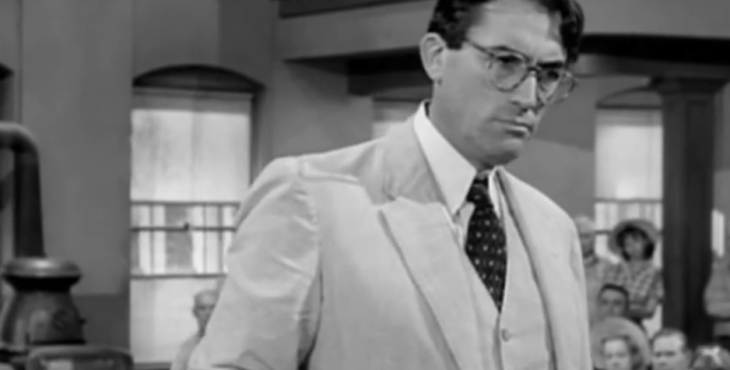One thing that has always struck me about “To Kill a Mockingbird”, the book is absent in “To Kill a Mockingbird”, the movie. In the movie, Atticus Finch states,
“In this country our courts are the great levelers, and in our courts all men are created equal. I’m no idealist to believe firmly in the integrity of our courts and in the jury system. That is no ideal to me…It is a living, working reality. Gentlemen, a court is no better than each man of you sitting before me on this jury. A court is only as sound as the men who make it up. I am confident that you gentlemen will review without passion the evidence you have heard, come to a decision, and restore this defendant to his family. In the name of God, do your duty. In the name of God, believe Tom Robinson.”
But in the book he says,
“One more thing, gentlemen, before I quit. Thomas Jefferson once said that all men are created equal, a phrase that the Yankees and the distaff side of the Executive branch in Washington are fond of hurling at us. There is a tendency in this year of grace, 1935, for certain people to use this phrase out of context, to satisfy all conditions. The most ridiculous example I can think of is that the people who run public education promote the stupid and idle along with the industrious— because all men are created equal, educators will gravely tell you, the children left behind suffer terrible feelings of inferiority. We know all men are not created equal in the sense some people would have us believe— some people are smarter than others, some people have more opportunity because they’re born with it, some men make more money than others, some ladies make better cakes than others —some people are born gifted beyond the normal scope of most men.
But there is one way in this country in which all men are created equal— there is one human institution that makes a pauper the equal of a Rockefeller, the stupid man the equal of an Einstein, and the ignorant man the equal of any college president. That institution, gentlemen, is a court. It can be the Supreme Court of the United States or the humblest court in the land, or this honorable court which you serve. Our courts have their faults, as does any human institution, but in this country our courts are the great levelers, and in our courts all men are created equal. I’m no idealist to believe firmly in the integrity of our courts and in the jury system—that is no ideal to me, it is a living, working reality. Gentlemen, a court is no better than each man of you sitting before me on this jury. A court is only as sound as its jury, and a jury is only as sound as the men who make it up. I am confident that you gentlemen will review without passion the evidence you have heard, come to a decision, and restore this defendant to his family. In the name of God, do your duty.”
The difference is that Harper Lee’s Atticus doesn’t believe that schools can be levelers. Only the courts can hold all men as equal not the schools. Perhaps screenwriter Horton Foote dodged the subject because when he wrote the screenplay, in the midst of the civil rights movement, what Harper Lee could address in her book was too hot to handle in a movie. Perhaps by that time the courts were the only remedy. Perhaps they still are now. It will be interesting to see what her new novel, “Go Set a Watchman,” will have to say on the topic. Can the schools do anything for the “children left behind?” What do you think?






Jim Mordecai
Are schools are segregated in terms of race and class. And, since the publication of To Kill a Mockingbird they have become more segregated aided by most states passing laws creating charter schools.
Jonathan
“Can the schools do anything for the “children left behind”? is an excellent question, that relates to what the purpose of schools are, and the reasons why we value education.
The school reform vision for education is narrow and standardized, and, despite it’s stated goals to impose achievement on every child, has already and will continue to, leave children behind. It’s mission to make every child career and college ready, is business minded and practical, but not so tolerant of the range of human aptitudes, interests and sensibilities that typifies and enriches a society . Its an educational vision whose main component is informed by economic and market needs. The arts, humanities, and human aspiration, being less practical, have been stripped away. It’s a lean, mean, free-market-driven, survival of the fittest (just say no), some what fascist, no time to teach the whole child agenda. And while it may have some merit, the school reform movement as a whole is small, anemic, and out of balance.
Harper Lee’s Atticus may ultimately be right in thinking that schools (alone) cannot be levelers. But their function in the body of our society and culture can ( and very often are) deeply fortifying and nourishing.